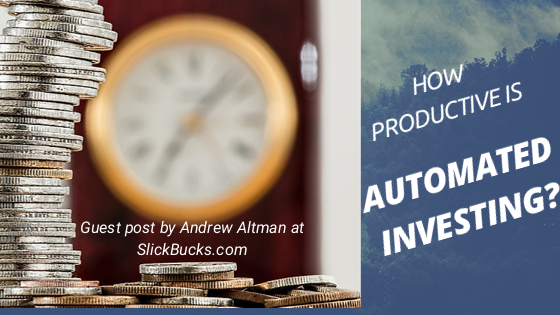Today I’ve got a guest poster! Some of you seemed to like the idea of the micro-investing, which I mentioned when reviewing Acorns. Well, Andrew from SlickBucks is more of an expert than I! Here he helps us learn more about automated investing, its pros and cons and whether it might work for you. I think for those of us (1) busy just keeping up with the day-to-day and (2) working with relative “spare change” in the investing world, it’s definitely worth a look! Heeeeeere’s Andrew……..
For generations, people who wanted to make the leap into the world of investing had two options. The first choice was to enlist the help of a financial investment advisor (the FIA model), and the second choice was to do-it-yourself (the DIY model).
Historically, the first option was expensive, requiring large initial investments and steep commissions and fees; and the second option was scary, leaving investors to fend for themselves in a complicated world.
Now there’s a third option – a new player has entered the game. It’s called ‘automated investing,’ or ‘robo advisors.’
Without getting too deep in techno-babble, automated investing is an application that uses computer algorithms to automate investment portfolios. There are a variety of companies offering these, starting from popular Acorns app (PM adds: see great SlickBucks review here), ending with Robinhood. They’re all a little different though, but essentially the process is the same: you open an investment account, and then you fill out a form spelling out your specific preferences (how much risk are you willing to take, are you looking for short-term or long-term gains, etc.). Then the robo advisor invests your money according to those preferences.
It sounds simple enough, but this is your money we’re talking about. Before making the leap, it’s worth looking at some of the pros and cons of automated investing.
Main Benefits of Automated Investing Choices
- Price. Automated services require much lower opening investments, and charge much lower fees – with some offering flat rates rather than percentage commissions.
- Expertise. For those who don’t have the time or energy to learn everything about investing, robo advisors use state of the art portfolio theory, efficient market hypothesis, and other advanced techniques. In fact, many of these algorithms are based on the work of winners of the 1990 and 2013 Nobel Prize in Economic Science.
- Transparency. Financial news is always featuring stories about unscrupulous advisors – financial managers who were motivated by their own profits, earning kickbacks by pushing products that weren’t helpful to their clients. Automated advisors base their recommendations on market trends, performance, and your preferences.
Important Downsides You Should Consider
- Not Human. They do personalize their strategies based on your preferences, but automated platforms aren’t human. They aren’t as flexible, and can’t adjust as quickly to unexpected developments in the market. A good financial planner will get to know you on a personal level, understanding all of the nuances and details of your specific goals more deeply than even the best questionnaire can.
- Simplicity. That sounds like a good thing, but some investors may be interested in more complex personalized services that a robo advisor can’t deliver, such as estate planning or specific investing for kids’ college.
- Garbage In – Garbage Out. Automated investors will follow your preferences based on the information you give them. This is only good if your information is good. If you’re young and selected ‘low risk’ on your preference, the robo advisor isn’t going to say “Um, you’re 23 with a great job and no debt – you should consider going with a higher-risk option.”
It’s no surprise that investing makes people – especially beginners – nervous. After all, the US stock market has crashed a couple of times since 2000. Still, for those who are looking to find ways to grow their money, stocks have historically performed better than any other asset class.
Weigh the pros and cons and make sure it’s right for you, but automated investing might just be the introduction to the stock market that you’ve been waiting for.
Andrew Altman is the editor-in-chief of an informational website SlickBucks.com. SlickBucks aims to help beginner investors and traders by reviewing financial products and brokerages, sharing advice and tips and publishing helpful guides for new investors and help them to get the kind of financial wealth they desire.
![InkedSb logo - small[601]_LI](https://productivemama.com/wordpress/wp-content/uploads/2017/06/InkedSb-logo-small601_LI-150x150.jpg) Facebook page: https://www.facebook.com/Slick-Bucks-1048647868614334/
Facebook page: https://www.facebook.com/Slick-Bucks-1048647868614334/
Twitter: @theslickbucks
Email: andrew at slickbucks dot com


2 comments